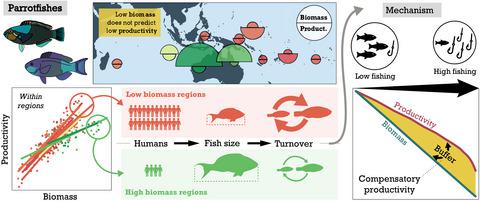当前位置:
X-MOL 学术
›
Glob. Change Biol.
›
论文详情
Our official English website, www.x-mol.net, welcomes your feedback! (Note: you will need to create a separate account there.)
Human exploitation shapes productivity-biomass relationships on coral reefs.
Global Change Biology ( IF 11.6 ) Pub Date : 2019-11-29 , DOI: 10.1111/gcb.14941 Renato A Morais 1 , Sean R Connolly 1 , David R Bellwood 1
Global Change Biology ( IF 11.6 ) Pub Date : 2019-11-29 , DOI: 10.1111/gcb.14941 Renato A Morais 1 , Sean R Connolly 1 , David R Bellwood 1
Affiliation

|
Coral reef fisheries support the livelihoods of millions of people in tropical countries, despite large-scale depletion of fish biomass. While human adaptability can help to explain the resistance of fisheries to biomass depletion, compensatory ecological mechanisms may also be involved. If this is the case, high productivity should coexist with low biomass under relatively high exploitation. Here we integrate large spatial scale empirical data analysis and a theory-driven modelling approach to unveil the effects of human exploitation on reef fish productivity-biomass relationships. We show that differences in how productivity and biomass respond to overexploitation can decouple their relationship. As size-selective exploitation depletes fish biomass, it triggers increased production per unit biomass, averting immediate productivity collapse in both the modelling and the empirical systems. This 'buffering productivity' exposes the danger of assuming resource production-biomass equivalence, but may help to explain why some biomass-depleted fish assemblages still provide ecosystem goods under continued global fishing exploitation.
中文翻译:

人类的剥削塑造了珊瑚礁的生产力与生物量的关系。
尽管鱼类生物量大规模消耗,但珊瑚礁渔业仍为热带国家数百万人口的生计提供了支持。虽然人类的适应能力可以帮助解释渔业对生物量枯竭的抵抗力,但也可能涉及补偿性生态机制。在这种情况下,在相对较高的开采量下,高生产率应与低生物量并存。在这里,我们将大型空间规模的经验数据分析与理论驱动的建模方法相结合,以揭示人类开发对礁鱼生产力与生物量之间关系的影响。我们表明,生产力和生物量对过度开发的反应方式之间的差异可以使它们之间的关系脱钩。由于选择大小的开采消耗了鱼类生物量,因此触发了单位生物量产量的增加,避免在建模和经验系统中立即导致生产力崩溃。这种“缓冲生产力”暴露了假设资源生产与生物量相当的危险,但可能有助于解释为什么在持续的全球渔业开发下,一些生物量枯竭的鱼类组合仍能提供生态系统产品。
更新日期:2020-01-08
中文翻译:

人类的剥削塑造了珊瑚礁的生产力与生物量的关系。
尽管鱼类生物量大规模消耗,但珊瑚礁渔业仍为热带国家数百万人口的生计提供了支持。虽然人类的适应能力可以帮助解释渔业对生物量枯竭的抵抗力,但也可能涉及补偿性生态机制。在这种情况下,在相对较高的开采量下,高生产率应与低生物量并存。在这里,我们将大型空间规模的经验数据分析与理论驱动的建模方法相结合,以揭示人类开发对礁鱼生产力与生物量之间关系的影响。我们表明,生产力和生物量对过度开发的反应方式之间的差异可以使它们之间的关系脱钩。由于选择大小的开采消耗了鱼类生物量,因此触发了单位生物量产量的增加,避免在建模和经验系统中立即导致生产力崩溃。这种“缓冲生产力”暴露了假设资源生产与生物量相当的危险,但可能有助于解释为什么在持续的全球渔业开发下,一些生物量枯竭的鱼类组合仍能提供生态系统产品。



























 京公网安备 11010802027423号
京公网安备 11010802027423号